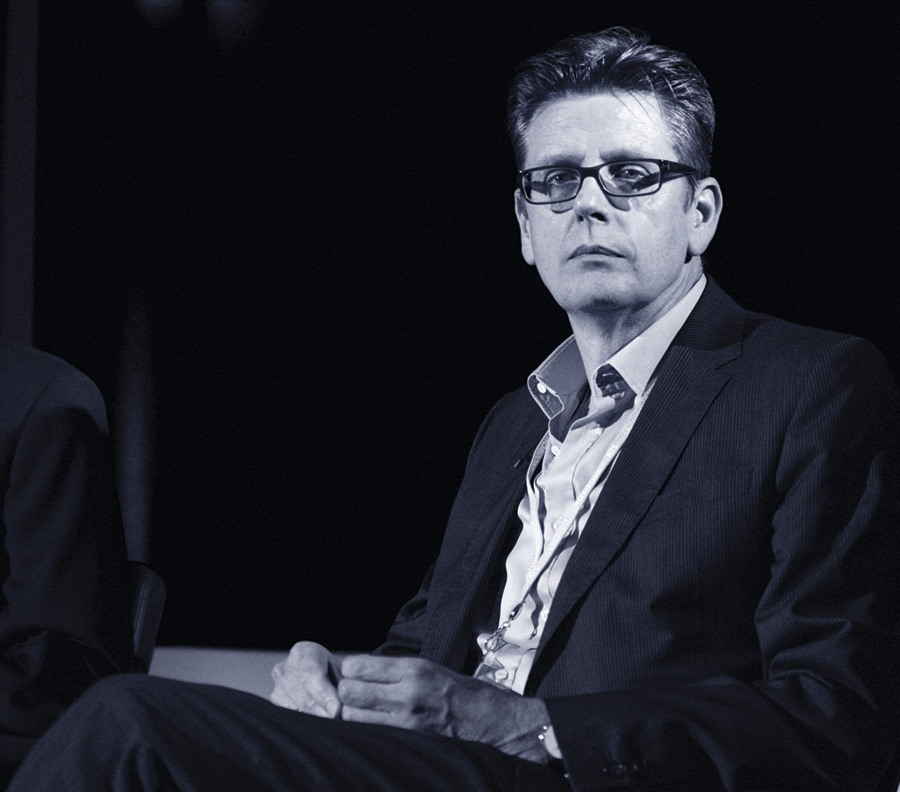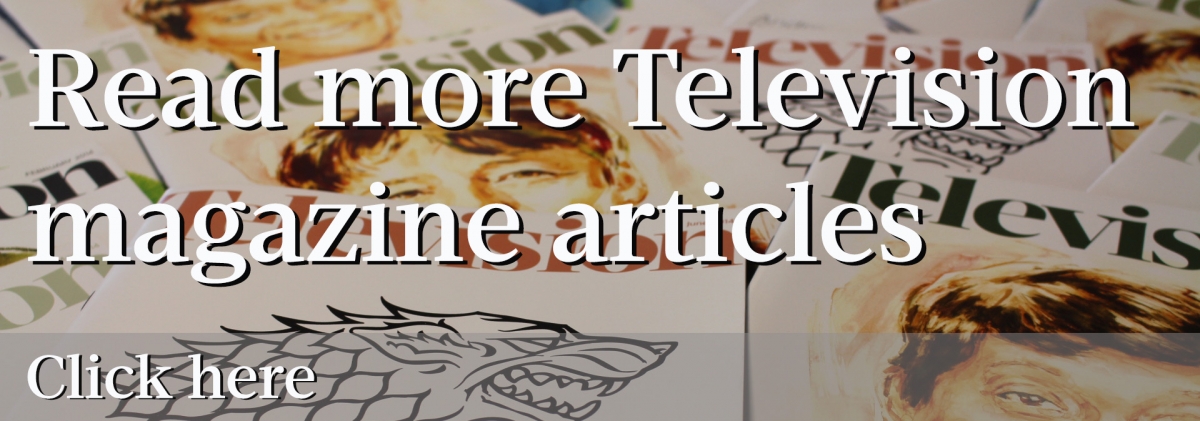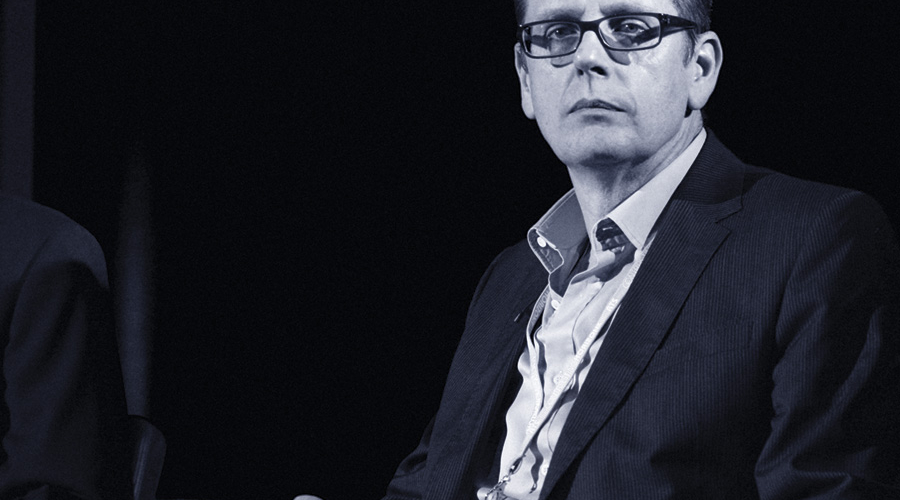Outgoing BBC Trustee David Liddiment explains to Steve Clarke why the Trust, the licence fee and the corporation’s budget all need to be defended
 Outgoing BBC Trustee David Liddiment (Credit: Paul Hampartsoumian)
Outgoing BBC Trustee David Liddiment (Credit: Paul Hampartsoumian)
The Secretary of State for Culture, Media and Sport, Sajid Javid, is convinced the BBC can deliver more efficiency savings. But can these be implemented without affecting existing services? David Liddiment thinks he knows the answer and it is not one likely to please Javid.
He believes enough cuts have already made been at the corporation; scrutinise the BBC’s channel line-ups, and the cracks in their services are clear for all to see.
SIf you look at the TV schedules closely, they are less rich than they used to be,T observes Liddiment, who last month stood down after eight years as a BBC Trustee. SLook post The BBC News at Ten on BBC One and before 8:00pm on BBC Two. Look at daytime on BBC Two.
SLook at the fact that BBC Four doesn’t go on the air until 7:00pm. What kind of modern channel is that? It’s the same with BBC Three.T
He believes the time is long overdue for politicians and papers such as The Daily Mail to stop their remorseless attacks on the BBC. Pigs might fly.
Liddiment, of course, knows what it’s like to be on the rough end of a good Westminster kicking. A few days after this interview, he was again in the Commons defending the BBC against hostile MPs in what would be his last public appearance as a Trustee.
Liddiment was on good form – smart, funny and noticeably unflappable as Conservative MP Philip Davies tried to wind him up.
He is exasperated by the negative newspaper stories, such as the ones continually alleging that the BBC is overstaffed.
Liddiment cites Javid’s criticism of how, as a minister visiting Jersey to meet the Commonwealth Games baton, he was shocked to find 10 BBC staff in attendance.
 SI can’t comment on that individual incident because I don’t know the exact circumstances,T says Liddiment. SWhat I will say is that an anecdote like that somehow becomes used as hard evidence that the BBC is inefficient, while very often failing to recognise the complexities of running multiple services and the complexities of programme making.T
SI can’t comment on that individual incident because I don’t know the exact circumstances,T says Liddiment. SWhat I will say is that an anecdote like that somehow becomes used as hard evidence that the BBC is inefficient, while very often failing to recognise the complexities of running multiple services and the complexities of programme making.T
He adds: SWhat matters to the audience more than anything else is great television, great radio, great services.
SThey want to feel the BBC is being well managed, and it hasn’t always been well managed. But, in a sense, the job of a body such as the Trust, the job of the National Audit Office, is to do a health check on whether the place is operating effectively and efficiently.
SAnd, by and large, those NAO reports give the BBC a pretty clean bill of health in terms of how it runs its major projects. Even the DMI [Digital Media Initiative] report was quite positive.
SI hope in the Charter debate we get down to some evidence-based arguments around efficiency.T
Many people – and not just those on the right of the Conservative Party – would disagree with this upbeat take on how the BBC operates.
But few could deny that, as an elder statesman of British TV, David Liddiment (who has occupied senior editorial roles at both ITV and the BBC) speaks with genuine authority.
His views get right to heart of the debate over the Trust’s future. The question a lot of sceptics ask is how the body – not so long ago written off as SbrokenT – can be both critic and cheerleader and not compromise its regulatory role.
People are not taking to the streets complaining about the licence fee
Already, one Tory MP has accused the new Trust Chair, Rona Fairhead, of Sgoing nativeT, despite her being completely new to the role.
Liddiment brought a unique sensibility to the Trust by virtue of his huge experience as a programme-maker, commissioner and broadcaster.
Whoever succeeds him as Chair of the Trust’s Editorial Standards Committee will need very big shoes, indeed.
Despite all the crises – Savile, McAlpine, the DMI disaster, rows over hefty pay-offs to BBC executives, to name a few – Liddiment is exiting the Trust with his reputation intact.
Arguably, his reputation is enhanced by the experience of being at the sharp end of helping to regulate the BBC in difficult times.
But why did he want the job in the first place? His broadcast-TV career was glittering, to say the least. And as a founder of All3Media (all ties with the producer have been severed following the sale to Discovery/Liberty), and with experience of working alongside Kevin Spacey at the Old Vic, Liddiment would never have been short of job offers.
SI was quite keen to become a Trustee because I’d been quite critical of the BBC Governors,T he recalls. SAnd because I believed in the BBC. I still believe in the BBC.
SI’ve never really understood why people are confused about being a critic and a champion… We’re there to protect the independence of the BBC and the public interest in the BBC and to ensure the BBC reflects the interest of licence-fee payers. We are, if you like, the protector of the institution.T
There have, however, been some tense moments at the Trust in recent years. Chris Patten’s leadership of the Trust was widely criticised and not only by hard-line BBC naysayers.
Liddiment concedes that mistakes were made, especially in the blurred lines of governance at the top of the organisation.
SI think the BBC Trust has had a bad press, particularly in the past few years,T he says. SOn one level, this is with some justification and that level is this: in the [licence-fee] settlement that created the Trust there was one fault line. There was a lack of clarity about the purpose of the Executive Board and, in particular, the non-executive directors versus the purpose of the Trust.
SThat led to some real confusion between the two bodies, particularly when things go wrong. When things go wrong you need absolute clarity about responsibility and accountability.
SThat was not what was communicated in the case of the PAC [Public Accounts Committee] hearings over DMI, or when we heard conflicting evidence over severance issues or, to some extent – although I think it was a separate issue – around the handling of the Savile crisis.
SPretty much in every case I think that was rooted in a lack of clarity of function between the two bodies.T
Changes have been made. These have involved a clarification of roles. The Trust has made it clear, too, that it expects non-executives to function similarly to non-executives on a conventional PLC board.
Liddiment claims that Severything is running efficientlyT now. Let’s hope, for Fairhead’s sake, he is right.
Looking to the future, he rejects outright the idea of Ofcom inheriting the Trust’s responsibilities should the next government abolish the Trust.
SI think the BBC is too important [to be regulated] by Ofcom,T he says. SIt is a very, very precious asset for the British public and a very precious asset for Britain internationally.
A great many young people are using YouTube as a major part of their viewing activity. It’s a different kind of viewing to sitting down and watching a half-hour programme or a one-hour narrative.
SThe BBC needs a body focused on its public purposes and the public interest in the BBC.
SYou can call it OffBeeb, if you like…We are well past the point when Channel 4 was out with the begging bowl. Channel 4 and the commercial TV market are all in good shape.T
On the licence fee, Liddiment believes it should remain in place, at least for the term of the next Charter: SIf it ain’t broke, don’t fix it. It works.T
He adds: SPeople are not taking to the streets complaining about the licence fee.
SIn the context of other elements of the cost of living it is not an extraordinarily high amount of money. I appreciate that it is for some people a significant amount of money.
SI don’t see the evidence in audience behaviour to make a change for this Charter. It is something that should be kept an eye on for the next Charter…
SEither you index-link it or you take out of the licence fee those bits and bobs that, frankly, have no business being there in the first place – such as funding local-TV and broadband roll-out.T
He appears to think that, to overcome the problem of people watching online without paying the licence, the fee should be extended to include devices other than TV sets. How this would work in practice is unclear.
In the face of all the high-profile rows that have engulfed Broadcasting House in recent years, it is sometimes forgotten that the Trust’s day job is to ensure the BBC provides distinctive, high-quality content across all services.
In this respect, Liddiment is convinced that improvements have been made since 2010.
The Trust’s recent report, published in July, assessed the four main TV channels and was broadly supportive of each network’s programmes. However, there were criticisms. Anxieties were expressed that, excluding BBC Three, audiences for BBC One, Two and Four were all getting older.
Is he worried that the under-34s are gradually shunning traditional, linear TV? SI am not so much worried about that as I am about how public service broadcasting, which I believe in, responds to the changing habits and changing opportunities of a digital media,T answers Liddiment. SThere’s no doubt that a lot of young people are not viewing linear channels, they’re viewing on their laptops… Mobile viewing is increasing rapidly.
SA great many young people are using YouTube as a major part of their viewing activity. It’s a different kind of viewing to sitting down and watching a half-hour programme or a one-hour narrative.
SThere are real challenges around how programme-makers, let alone broadcasters, respond to the changing needs of our audiences.
SThey are challenges, if you like, about delivering public-service programmes, impartial news, current affairs, programmes that inform young people about the democracy they are living in and their role in that democracy. That’s got to be a very important challenge for the BBC.T
One of the biggest challenges editorially is how flagship channel BBC One should respond to evolving viewing patterns and changing audience tastes.
The Trust praised the service for the progress it had made in backing distinctive drama. Shows such as Luther and Call the Midwife were singled out.
But more work needed to be done in refreshing the schedule overall and in what Liddiment describes as Sthe big factual showsT on BBC One, where he says it is Swork in progressT.
The Trust’s decision on whether to accept Director-General Tony Hall’s idea of moving BBC Three to an online-only service is expected to be made early next year. SIt’s not an issue I will be involved in,T says Liddiment.
Responding to David Attenborough’s recent criticism that BBC Two had become indistinguishable from BBC One, and that truly serious documentaries were no longer being broadcast, Liddiment says that across BBC Two and Four, Swe’ve got a broader range of factual output than the BBC has ever carriedT.
He adds: SI want to praise the BBC when I think it’s due, but I want to exhort the BBC always to be prepared to go into new territory and to innovate. I think it does, but I think it could do more.T
Greg Dyke famously said: SIt’s the programmes, stupid.T Liddiment endorses this statement when he concludes our conversation by saying: SWhatever systems you put in place, there will be more misjudgements, more mistakes, more crises, but the most important thing is we keep focused on what the BBC does and how it serves licence-fee payers… At the end of the day, what matters about the BBC is what it makes.T
The Trust beats the Governors
David Liddiment: ‘If you look at the work of the Trust in the round – the work around editorial complaints and standards, the creation of the service licences, the service-licence reviews, and holding the BBC to account for what it actually puts out to the public, having a body that has a clear responsibility to listen to licence-fee payers and reflect their views in the way it assesses the BBC services – all of that has been an improvement on the previous governance regime.
‘We are more outward-facing. The Trust has specific responsibilities to listen to licence-fee payers and we have got a clarity in the function and the purpose of each BBC service, against which the commercial competitors can judge that output and judge the BBC.’
Was George the right man?
David Liddiment: ‘George Entwistle was a very credible candidate for BBC Director-General. He made very persuasive arguments about the kind of BBC he wanted to lead and the changes he wanted to make.
‘He had the full support of the Trust’s Appointments Board [on which Liddiment sat] and he got engulfed in the Savile crisis almost within a week or two of him taking his desk…
‘Subsequent events revealed that he lost control of the situation… I wouldn’t say it was a mistake to have appointed him.
‘It was a very sad sequence of events that saw him resign. It was a personal tragedy for him. He was a very talented and honourable man, and in the end he did the honourable thing.T
The Shadow of Savile
David Liddiment: ‘It was a terrifying narrative of infighting and cock-up. The only comfort I take from it is that very few crises occurring in any business or company get scrutinised and reported on to that degree…
‘One of the unfortunate things about the Savile crisis is that the BBC has taken the hit for, if you like, the broad moral landscape that we all lived through from the 1960s, 1970s.
‘It has happened, we can’t unpick that. The behaviour in all walks of life, the way women were treated, not just in the BBC, would not stand up to close scrutiny by today’s values, thank God... We can’t be complacent about that, but we have come a long way.’
‘Were BBC colleagues intimidated by Savile? I have no idea. I wasn’t there. I was in the business, I was in television, I did not hear any rumours.
‘I had very little to do with the man. I met him twice when I was Controller of Entertainment at the BBC. But I had no sense that he was doing anything untoward. I mean, he was just a bit weird… the track suit, the silly voice and the cigar.
‘I had to tell him Jim’ll Fix It was ending. He took it perfectly well.’
Jewels in the BBC's crown
David Liddiment: ‘BBC Two drama is one of the jewels in the crown of the BBC. There’s been Peaky Blinders, The Fall and Marvellous, and more to come with Wolf Hall.
‘Bake Off was one of those classic BBC Two success stories that come out of the blue and out of a space that no one else is in. No commercial network was going to invest in baking. Janice Hadlow [then Controller of BBC Two] had the insight and foresight to do that.
‘Happy Valley on BBC One was an extraordinarily sophisticated, complex, multi-layered drama and the audience brilliantly rose to the occasion. I think it got the highest AI [Appreciation Index] ever for a BBC drama.
‘Peaky Blinders was very bold in its form, highly stylised – visually and aurally – and created this mythic world of the British Midlands. Wasn’t that glorious?
‘BBC Two’s Stargazing and Lambing Live, the whole notion
of taking what they’ve learnt from Springwatch and doing live coverage of, as it were, natural occurrences.
‘They’re exciting, accessible TV. They are exemplary shows. No one has been in that territory. The BBC invented live, factual event TV and doesn’t get the credit that it deserves for it.’







